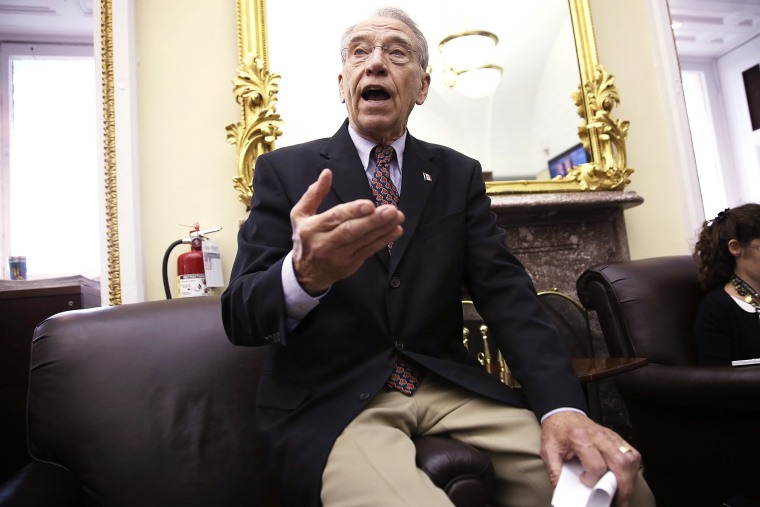Republican Joy Corning and Democrat Sally Pederson, both former Iowa lieutenant governors, are teaming up to try to convince Grassley to hold hearings for Obama's court pick, Merrick Garland. They held a Thursday press event in Des Moines to remind him of his roots. "You voted in favor of Iowa's constitutional amendment that took campaign politics out of Iowa's judicial system," said Corning, citing a 2014 interview in which Grassley boasted about voting as a state lawmaker to prevent political parties from nominating judges. "You express great pride in that vote, and I quote, 'It was a very forward-looking thing to do what we did 50 years ago.'" That's a sharp contrast to what's happening today, she said. "Throughout your career, Chuck, you have been a fair-minded, common-sense consensus builder," the former GOP official continued. "Refusing to fill the Supreme Court vacancy is none of those things."
'This is not the Chuck Grassley we thought we knew'
A leading Iowan complained this week, "This is not the Chuck Grassley we thought we knew." In every way that matters, it's because he's not the same senator.

In his home state of Iowa, Senate Judiciary Committee Chairman Chuck Grassley generally isn't accustomed to getting bad press, but recently developments have cast the Republican senator in a decidedly unfavorable light. His clumsy, at times borderline scandalous, handling of the current Supreme Court vacancy have raised the kind of doubts about Grassley's work and professionalism that he'd prefer to avoid -- especially in an election year.
The Huffington Post reported yesterday on two former top government officials in Iowa who find themselves "wondering what happened to the Grassley they used to know: a legislator who proudly helped take politics out of the state's judicial confirmation process."
Pederson added, "[T]his is not the Chuck Grassley we thought we knew."
And to a very real extent, this isn't the Chuck Grassley that Iowans have gotten to know over his decades-long congressional career. In 1987, the GOP senator declared, "The dangers of politicizing the nomination process are exceeded only by its short-sightedness. After all, presidential elections and Supreme Court nominations come and go. I urge my colleagues to resist the clarion call of raw politics that undermines the independent judiciary."
That Grassley obviously bears no resemblance to the current Grassley.
But the broader point extends well beyond Iowa's senior senator. His shift is undeniable, but what matters just as much are the conditions that pushed Grassley so far to the right.
As Republican politics has become more radical, the GOP's elected officials have had to decide whether to fight the tide or move with it. Those who've resisted, even a little, have been washed away in primaries (see Dick Lugar, Mike Castle, Bob Inglis, et al), run out of Capitol Hill (see John Boehner), or even pushed out of the GOP altogether (see Charlie Crist, Arlen Specter, et al).
It's why most Republicans prefer to simply go with the right-wing flow, satisfying both the party's base and their own desire to keep their jobs.
When people say they don't recognize Chuck Grassley anymore, they're not wrong, but the unstated subtext is that they don't recognize the Republican Party anymore.
There's no reason to single out Grassley. Sen. Orrin Hatch (R-Utah) used to boast about being a "square peg" -- the title of his 2002 autobiography -- because of his routine breaks with party orthodoxy. Now Hatch is among the Senate's most brazen and unapologetic partisans, whose cringe-worthy antics were fairly described yesterday as "sickening."
In 1984, Sen. Mitch McConnell (R-Ky.) ran as a moderate. Sen. John McCain (R-Ariz.), throughout his career, took pride in his independent streak. For most of these senators' lengthy careers, the very idea that they'd support an unprecedented blockade against a qualified, moderate Supreme Court nominee would have seemed ridiculous.
And yet, here we are.